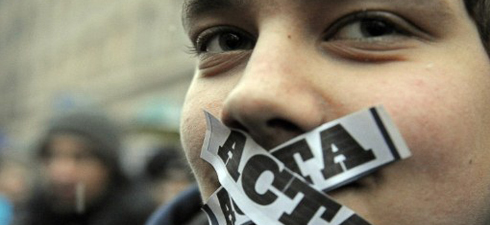Grzegorz Szymanik: What does the Internet mean for young people?
Piotr Cichocki: I once researched the Grono community portal [a Polish social network similar to Facebook], observing how its users create their virtual identities through profiles. Many introduced themselves by means of linking. Instead of writing about themselves, they’d post quotations from books, songs. Or links to YouTube videos or MP3 files. Their identity was woven of many meanings collected on the web.
What does this signify? That online information shapes internet users’ identities. Provides building material for them. And young people share what they discover. Preventing them from doing so would be like identity amputation. They are protesting because they are afraid that ACTA may label their existential choices and free expression of identity as piracy. They’re really frightened that someone wants to confiscate a part of their identity.
That’s why everyone is protesting, regardless of political sympathies: young people in favour of all kinds of options, both Antifa [an anti-fascist movement] and the far right. For them, the internet is an environment in which they function, gathering information about what interests them and shaping themselves politically. And they want the web to remain this way.
And what about copyright?
These young people don’t regard what they do on the web as theft. If something is there, you use it. You can consider this in terms of breaking the law.
You should. Because it’s theft.
It’s theft, but you can’t use the same terms with information or culture as with material property.
How the sale and exchange of culture is perceived today seems a rather new invention. Henry Jenkins described the phenomenon on the example of the culture of the United States. He said in the 19th century culture had no owner. Songs were exchanged between villages and folk ballads reused material from literary texts.
Professionalization and content reservation appeared with the culture industry. Singers became vocalists and that was because their songs were broadcast on radio and TV and played back from records.
The situation changed when personal computers appeared at home, enabling any user to edit sound, footage, text, mixing, remixing, sharing. Grassroots culture is coming back and the cultural industry is in danger.
Creatively developing all kinds of online productions is on the verge of legality. But perhaps it’s the notion of legality that’s out of tune with the real? Relationships between production and consumption are changing and we don’t know which way things are going to go.
Legislative solutions such as ACTA, which most Internet users protest, try to push the line so as to boost industrial producers’ profits, to protect and hedge around their roles.
But artists will go starving.
Artists themselves are searching for new and alternative distribution channels, independent of major corporations, as evidenced by the internet publications of performers such as Radiohead or the huge success of direct-selling music portals e.g. bandcamp.com.
ACTA has been all the talk over the last few days. The Anonymous group blocks Polish government websites. Popular sites blacken out their screens. Users create visuals. Portals write. The government comments. Were internet users aware of their power before?
If we’re talking about the narrow group that made all the fuss, the experienced software engineers and hackers who do political stuff after hours, about people who identity themselves with the free code movement — the answer is yes. Whoever they are, they know very well how to modify codes, how to navigate around the web. They’ve grown up on it. Now not only spending their free time online, but also learning and working.
The optimistic conclusion is that we have many talented programmers.
And the audience of this show? In the past you took to the street, today you can help by flooding sites to block them. Is this how an internet community is emerging?
It is emerging as opposition. The common factor is protest against restrictions that may affect their very lives, limit their participation in the world. In an extreme case, this could even turn into something like 1980 Solidarity. Social masses of different backgrounds gather under a single slogan because the political system has hit at the foundations of their life. Because for them it’s something absolutely elementary.
I analyse memes I find on my friends’ computers. A recent one was particularly on the spot. “The government steals your money” – and an indifferent face. “No prospects for a better tomorrow” – and a care-not face again. Finally, “Limited access to the web” – and the image of Arnold Schwarzenegger reloading a big gun.
Translated from the Polish by Marcin Wawrzyńczak
Profile
Piotr Cichocki
Piotr Cichocki is a Polish Internet anthropologist at Warsaw University’s Institute of Ethnology. He is also a concert organizer, music producer and art promotor. He gives lectures on the "fusion of the modern men's identity with electronic media and popular culture".
Was this article useful? If so we are delighted!
It is freely available because we believe that the right to free and independent information is essential for democracy. But this right is not guaranteed forever, and independence comes at a cost. We need your support in order to continue publishing independent, multilingual news for all Europeans.
Discover our subscription offers and their exclusive benefits and become a member of our community now!












